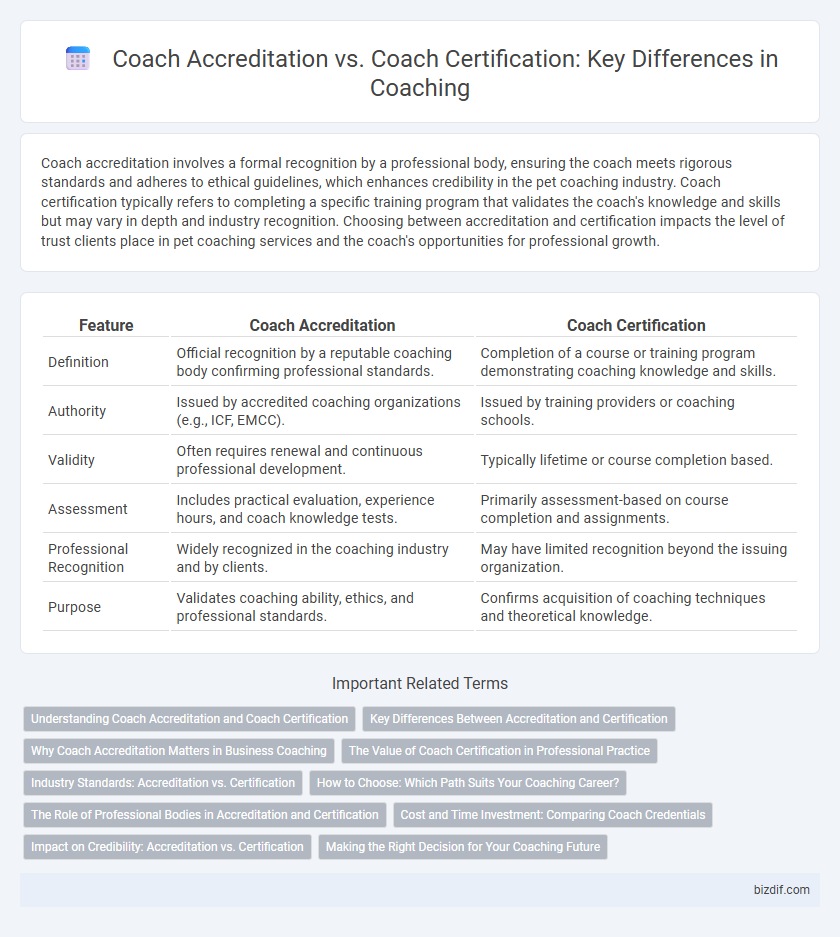Coach accreditation involves a formal recognition by a professional body, ensuring the coach meets rigorous standards and adheres to ethical guidelines, which enhances credibility in the pet coaching industry. Coach certification typically refers to completing a specific training program that validates the coach's knowledge and skills but may vary in depth and industry recognition. Choosing between accreditation and certification impacts the level of trust clients place in pet coaching services and the coach's opportunities for professional growth.
Table of Comparison
| Feature | Coach Accreditation | Coach Certification |
|---|---|---|
| Definition | Official recognition by a reputable coaching body confirming professional standards. | Completion of a course or training program demonstrating coaching knowledge and skills. |
| Authority | Issued by accredited coaching organizations (e.g., ICF, EMCC). | Issued by training providers or coaching schools. |
| Validity | Often requires renewal and continuous professional development. | Typically lifetime or course completion based. |
| Assessment | Includes practical evaluation, experience hours, and coach knowledge tests. | Primarily assessment-based on course completion and assignments. |
| Professional Recognition | Widely recognized in the coaching industry and by clients. | May have limited recognition beyond the issuing organization. |
| Purpose | Validates coaching ability, ethics, and professional standards. | Confirms acquisition of coaching techniques and theoretical knowledge. |
Understanding Coach Accreditation and Coach Certification
Coach accreditation involves official recognition by a professional body confirming adherence to established coaching standards, ensuring credibility and ethical practice. Coach certification typically refers to the completion of specific training programs that equip individuals with coaching skills and methodologies, often serving as a prerequisite for accreditation. Understanding the distinction clarifies the pathway for professional development and validates a coach's expertise in delivering effective coaching services.
Key Differences Between Accreditation and Certification
Coach accreditation validates the organization providing training meets industry standards, ensuring program quality and credibility. Coach certification evaluates an individual's skills, knowledge, and competency in coaching, confirming their professional qualifications. Accreditation emphasizes institutional credibility, while certification focuses on personal competency and practical expertise.
Why Coach Accreditation Matters in Business Coaching
Coach accreditation provides verified credibility through recognized industry standards, ensuring a coach meets rigorous competencies essential for effective business coaching outcomes. This formal validation differentiates accredited coaches from those solely holding certifications, which may lack standardized evaluation processes. Businesses prioritizing accredited coaches gain confidence in consistent performance, ethical practices, and measurable impact on leadership development and organizational growth.
The Value of Coach Certification in Professional Practice
Coach certification demonstrates a standardized level of expertise and adherence to industry best practices, enhancing credibility and trust with clients. Certified coaches often have access to advanced tools, ongoing education, and professional networks that support sustained career growth. This formal recognition distinguishes practitioners in a competitive market, signaling commitment to ethical standards and continuous development.
Industry Standards: Accreditation vs. Certification
Coach accreditation signifies that a coach has met rigorous industry standards set by a recognized governing body, ensuring adherence to ethical practices and continuous professional development. Coach certification often indicates completion of a specific training program but may lack the comprehensive evaluation and ongoing accountability associated with accreditation. Industry standards prioritize accreditation as a mark of credibility, demonstrating verified competence and commitment in the coaching profession.
How to Choose: Which Path Suits Your Coaching Career?
Choosing between coach accreditation and coach certification depends on your career goals, credibility needs, and professional development focus. Accreditation typically involves meeting rigorous standards set by recognized coaching bodies like the International Coach Federation (ICF), enhancing your legitimacy and client trust. Certification often signifies completion of specific training programs, offering foundational skills but varying widely in industry recognition and depth.
The Role of Professional Bodies in Accreditation and Certification
Professional bodies establish rigorous standards that define the criteria for coach accreditation, ensuring practitioners meet validated competencies and ethical guidelines. Coach certification typically involves a structured training program recognized by these bodies, verifying the coach's skills through assessments and practical evaluations. These organizations uphold industry integrity by continuously updating accreditation frameworks and certification processes to reflect evolving coaching methodologies.
Cost and Time Investment: Comparing Coach Credentials
Coach accreditation often requires a significant time investment, involving comprehensive training hours, supervised coaching sessions, and rigorous assessments, which can lead to higher overall costs. Coach certification typically demands less time, focusing on completing specific courses or workshops, making it a more affordable option with quicker credential acquisition. Evaluating the balance between cost and time commitment helps aspiring coaches decide whether accreditation or certification aligns better with their professional goals and resources.
Impact on Credibility: Accreditation vs. Certification
Coach accreditation typically involves a rigorous evaluation process by a recognized professional body, enhancing a coach's credibility through established standards and peer recognition. Certification often reflects the completion of a specific training program, providing proof of knowledge but may vary in credibility depending on the issuing organization. Accreditation generally carries greater weight in demonstrating a coach's expertise and commitment to ethical practices, thereby increasing client trust and professional opportunities.
Making the Right Decision for Your Coaching Future
Coach accreditation involves a rigorous evaluation process by recognized governing bodies, ensuring adherence to industry standards and ethical guidelines, while coach certification typically reflects the completion of a training program focused on coaching skills development. Selecting between accreditation and certification requires understanding how each option impacts your credibility, client trust, and professional growth within the coaching industry. Prioritizing internationally recognized credentials with proven assessment criteria will significantly enhance your coaching career trajectory and marketability.
Coach accreditation vs coach certification Infographic

 bizdif.com
bizdif.com